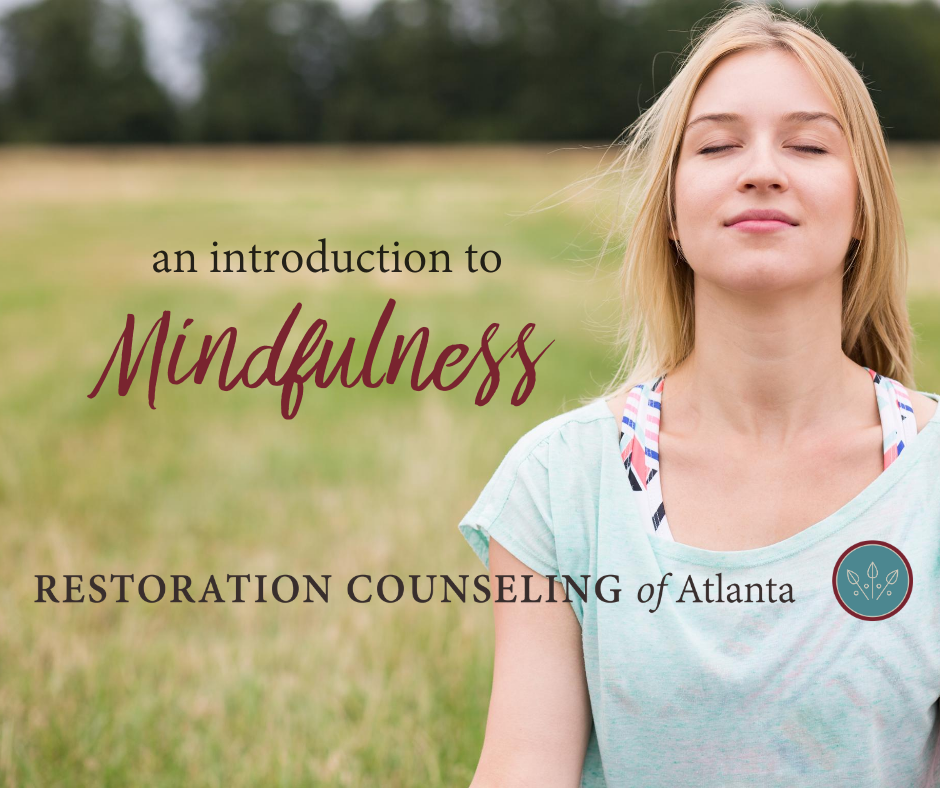No doubt, you have heard of mindfulness as it has gained popularity both in popular culture and psychology. Let’s dive deeper into mindfulness, what it is, and how it can be incorporated into your life.
What is mindfulness?
Simply put, mindfulness is “the basic human ability to be fully present, aware of where we are and what we’re doing, and not overly reactive or overwhelmed by what’s going on around us” (Staff, 2020). Mindfulness is being present in the moment you are living in. It is typically practiced either by sitting quietly while meditating or by fully engaging your mind in an activity such as eating or walking. It’s important to remember that mindfulness is not a religion or even a philosophy; it is a practice.
Why is mindfulness so popular?
You can find pictures of beautiful people practicing mindfulness on Instagram. You’ve probably seen a magazine dedicated to mindfulness at the checkout counter of a bookstore. If you’re in counseling, your therapist may have introduced you to it in one of your sessions. Mindfulness is becoming a part of our culture.
Many would argue that mindfulness has gained its popularity due to the fast-paced society we live in, where chronic stress and busyness are the norms. Mindfulness feels like a respite for many who feel the pressure to perform all the time. It has gained popularity within psychology due to the research evidence backing its efficacy in treating mental health struggles such as anxiety and depression.
Mindfulness and Christianity
I remember feeling wary when I was first introduced to mindfulness. It was a foreign concept, and I had always heard it was bad because it has roots in other religions, such as Buddhism. While it is true that many of the popular advocates for mindfulness take their cues from Buddhist teachings, remember that mindfulness is a practice, not a religion. Furthermore, Christians have engaged in forms of mindfulness for centuries through prayer, meditation on scripture, and Lectio Divina. Mindfulness is a wonderful practice that not only helps us become more present and calmer but can also help us become more aware of God’s presence in each moment. It allows us to access gifts that God offers to us.
Gifts from God
- The gift of living in the present. In Matthew 6:26-28, God tells us that we don’t have to spend our time worrying about the future. Instead, God will give us what we need each day in the present.
- The gift of rest. 1 Kings 19 tells of Elijah fleeing from queen Jezebel, who wants to kill him. Elijah is so afraid that he prays that he might die. At that moment, God does not tell Elijah that he must pray more, run faster, or think about all the things he could have done things differently so that the queen wouldn’t be chasing after him. Instead, God sends an angel who gives Elijah food and drink so that he can rest. When we are in a state of despair or fear, mindfulness is a simple practice that can help us rest our minds and bodies.
- The gift of peace. In Jeremiah 29, many Israelites had been exiled from Jerusalem, the land that God had given them, to Babylon. In the famous verse, Jeremiah 29:11, God says to the exiles, “For I know the plans I have for you, plans for peace, not evil, to give you a future and hope….” What we don’t often read are the prior verses where God tells the exiles to build homes and plant gardens in Babylon. He tells them to live right where they are and have peace…in the moment!
A Mindfulness Practice
Mindfulness is practiced in many ways. I’d like to introduce a simple practice to you that incorporates scripture.
- Find a comfortable seated position and close your eyes.
- Put your feet flat on the floor and your hands comfortably in your lap.
- Take three deep breaths focusing your attention on your breath. Allow your breathing to go back to normal.
- Take a few moments and meditate on the scripture, “Be still and know that I am God.” You can repeat it or say it once, slowly focusing on each word.
- If your mind wanders to other thoughts, bring your attention back to the scripture. Allow it to be an anchor, not a ball and chain.
- When you are finished, open your eyes.
Final Thoughts
I used to be afraid of mindfulness. As I learned more, I found that it was extremely helpful. I realized that I didn’t have to be afraid of turning my attention to the present moment because God was the creator of that very moment. There was no need to be wary of connecting with my breath (a common practice in mindful meditations) because God is the one who puts breath in my lungs. Mindfulness didn’t take me away from God. It gave me the ability to become more aware of God.
 Written by Ashley Skinner
Written by Ashley Skinner
ashley@restorationcounselingatl.com
Woodstock Location
Ashley takes a multi-theory approach to psychotherapy. This allows her to take the whole person into account – mind, body, and soul. Her emphasis is on Cognitive-Behavioral Therapy, Narrative Therapy, and mindfulness techniques. She works with individuals, ages 18 and up, who are dealing with anxiety and/or depression, postpartum anxiety and/or depression, trauma, abuse, life transitions, self-esteem issues, and grief.
Works Cited
Staff, M. (2020, July 8). What is Mindfulness? Retrieved from Mindful.org: https://www.mindful.org/what-is-mindfulness/

